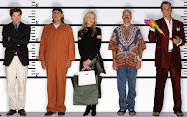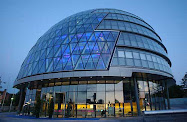
This is not going to be a review so much as a lesson on how to write a better movie. Though, the following comments will seem a bit obvious considering how The Day the Earth Stood Still remake completely missed the mark in its genre and its message. The movie was bad, and I blame 90% of it on the script (the other 10% on directing and editing). But I make all sorts of justifications for science-fiction, my chosen poison, and I don't think Keanu Reeves is a bad actor. Is he a good actor? No, but he fits well into the roles that he plays. And let's not forget that he was part of Bill and Ted's Excellent Adventures, one of my favorite late-80s comedies.
So instead of focusing on all of the ways this film failed, I'm going to write about how it should have been rewritten (though I don't think the original needed to be updated).

This modern take on the alien-visitor-with-a-message-of-peace story involves two simple concepts: why the earth needs protecting and why humanity deserves to be saved. This film does not answer either of these questions. Instead of explaining all of the ways humans have been disregarding or destroying the earth (I, for one, am pretty anti-plastic, considering they don't decompose and sit in landfills forever), this film focuses on CGI effects. And instead of showing us human compassion -- which is presumably something that is specific to humans (aliens never seem to understand this concept, do they?) -- this movie shows missile attacks and aggressive action without cause. Before Klaatu even comes out of his ship (I admit, a cool looking translucent sphere), someone shoots him. There's no reason for it. Someone shoots him because that's what humans do. We attack the foreign, and we destroy the unfamiliar before it can destroy us. So not only do we not get an environmental message that offers solutions to our wasteful ways, we don't really get the feeling that humans deserve to be saved. (This, of course, is a permeating theme throughout Battlestar Galactica, beginning with Adama's speech from the "Miniseries." But I digress.) Why save a species that is so intent on destruction?
In the film, compassion is shown in one scene and one scene only. And it's not a very good example of it. Helen Benson (Jennifer Connelly) is the step-mother to Jacob (Jaden Smith, who is an excellent crier but cannot deliver a line to save his life), and they have a rocky relationship because Jacob feels like his dead father left him all alone in the world. At his father's grace, Jacob asks Klaatu to bring him back from the dead, and when Klaatu says that he can't, Helen enters and hugs and comforts her son. Klaatu watches and suddenly he thinks humans can change their nature. Wait, what? Helen and Jacob may have a rocky relationship, but neither of them really change, at least not in a way that Klaatu would observe. But this was the moment where Klaatu goes, "Okay, maybe these humans aren't so bad after all." No offense to humanity, but if I were Klaatu and I turned on the television and saw all of the riots and thievery, I would think, "So in this moment of crisis, this is how you spend your last moments? Good riddance."

So here's how to fix the story, which seriously comprises 90% of the problems...
I buy Jennifer Connelly as an intelligent, so she can stay in the role as Dr. Helen Benson, but she needs to lose the sad face. Throughout the entire movie, she has this look of maternal worry, and it was really distracting. To fix this, she should be the stoic scientist, someone who cares only about facts and data, and this is why she retains a distant relationship with her son. Her son tries to reach out to her, but she just doesn't have time for feelings. On paper, this would seem to be a cliché for scientists, but the actress would have to flesh it out on screen. When Klaatu first lands in Central Park, Connelly played Benson as mesmerized by something shiny rather than inquisitive at the awesomeness of this alien object. Jodie Foster in Contact comes to mind. That has to be one of my favorite female roles; she's intelligent and logical, and yet still very feminine and caring. (Intelligent doesn't have to mean heartless. Hollywood, take note.) Also, I'm reminded of the stripper friend from Independence Day who looks upon the spaceship's light beam and says, "It's so beautiful" (right before being blown up). There needs to be that curiosity and appreciation for difference, otherwise I won't buy her as a serious scientist.
So the first thing is to make Dr. Benson more science oriented and less motherly. In emphasizing this characteristic, her reunion with her son would be that much more compelling. In the moments before the world ends, she chooses her son over science, and as Klaatu watches her do this, it is then and only then that he realizes there is more to human life than excessive selfishness. There are choices that people have to make, and even though Dr. Benson would be more inclined (or predetermined) to choose science, she chooses her son, she chooses that human connection. And this choice would involve something like going with Klaatu to his planet after the destruction of earth or being able to see something that no other human would have the opportunity to see, and she chooses to be with her son, someone she sees every day. The film would be less about the humans trying to attack Klaatu's biological robot protector GORT (which this film spent way too much time on) and more about Benson's detached and removed relationship with Jacob.
Similarly, the film would focus on Klaatu having human experiences. He meets an Asian man in McDonald's (hey, nice product placement, 20th Century Fox) who has lived on earth for seventy years and chooses to die when they do because he feels that earth is his home. Now, I don't think Klaatu should go around living the full human experience -- because, after all, his entire purpose is to eliminate the human species -- but that he comes across them unexpectedly. For example, someone gives up their seat to him on a bus or train, and he doesn't understand why someone would do this for him. Or he comes across religion, something his race doesn't have. Or he gets a cramp in his leg, and this is a type of pain he's never known before. There's something to be explored in an alien living in a human body, and the film doesn't take this any further than Klaatu drinking water for the first time and having difficulty synchronizing his eye-hand coordination.

In short, this film should have been a character study. It should have been Dr. Benson and the family/compassion of humanity on the one hand, and Klaatu and understanding how humans live on the other. (Perhaps Dr. Benson tells Klaatu a sob story and she's crying but Klaatu doesn't know what tears are, and then later he cries. Although, come to think of it, I may have seen that already done in a movie before. But something along those lines.) The movie should NOT go back and forth between what Benson is doing and what the military is doing. (And Kathy Bates as the Defense Secretary was laughable. Seriously, I laughed.) The movie should be a character study. And it should have at least explained -- in a more direct approach -- how the humans have mistreated the earth and some suggestion as to how they will change their future actions. When the movie ended, I got no resolution on the environmental front. There was no indication that humanity at large even got the message that their race was almost destroyed because they're too lazy to recycle. I'm not saying the movie should be as blatant as WALL-E, but if you're going to bring saving the earth into the mix, you need to show me that the humans will eventually save the earth on their own.
And there you have it.









.jpg)


No comments:
Post a Comment